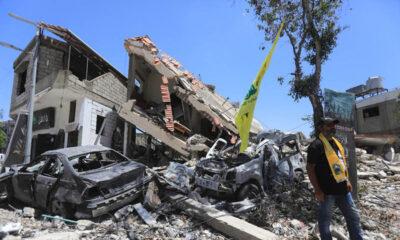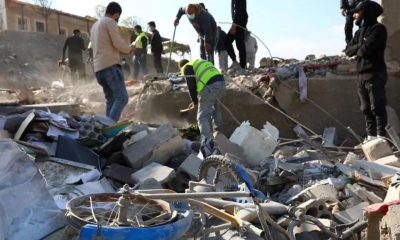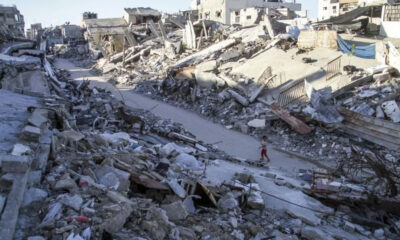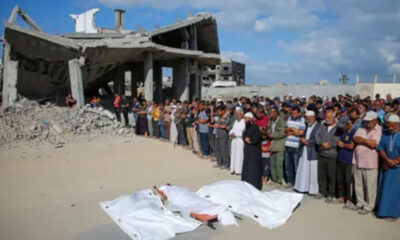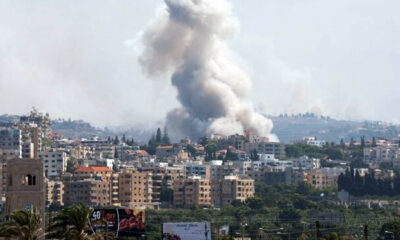International
Anger, grief in south Lebanon city, almost deserted after Israeli strikes
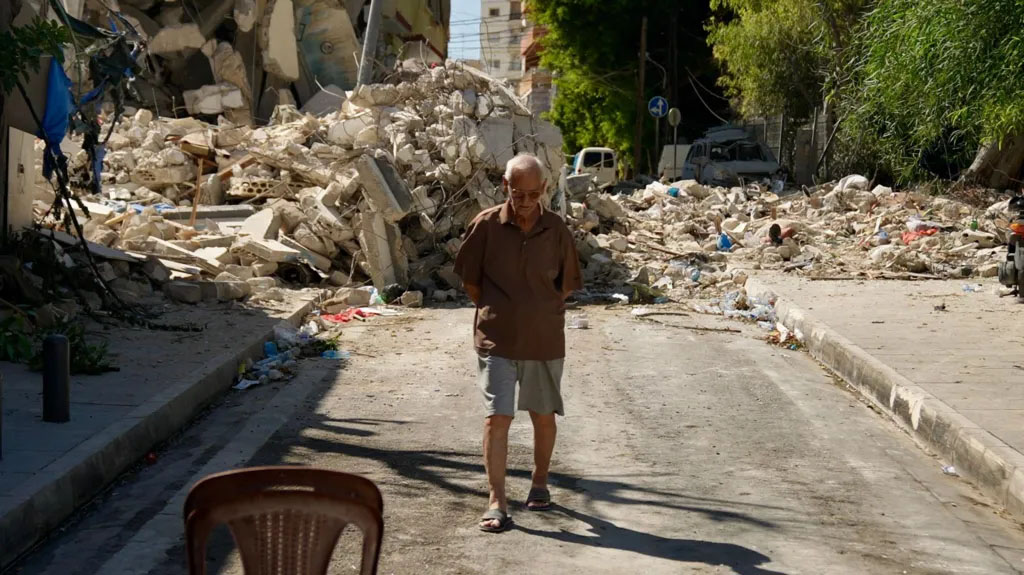
Anger, grief in south Lebanon city, almost deserted after Israeli strikes
Conversations in Tyre in southern Lebanon happen in a hurry now. It’s not wise to linger on the streets, and there are fewer and fewer people to talk to.
Chats can be cut short by the rumble of Israeli bombing, or the sound of outgoing rocket fire by Hezbollah – which can attract incoming fire.
Israeli drones buzz overhead.
You drive fast, but don’t speed, knowing there are eyes in the sky. Mostly you are the only car on an empty road – which can make you a target.
That knowledge is always with us, like the body armour we now wear.
But civilians here have no armour plating to shield them, and many Lebanese no longer have a roof over their heads. More than one million have been forced to flee, according to the Prime Minister, Najib Mikati.
War has created a vacuum here – sucking the life out of this ancient city proud of its Roman ruins, and golden sandy beach.
Streets are empty, and shops shuttered. The seashore is deserted. Windows rattle with Israeli air strikes.
The local civil defence headquarters lies abandoned – rescue teams were forced to evacuate – to save themselves after they got a telephone warning from Israel.
Israeli strikes are getting louder and closer to our hotel – in recent days several strikes on the hills opposite us appear to involve some of Israel’s most destructive bombs, weighing in at 1000lb.
And then there is the Hezbollah factor. Even as the armed group is trying to hold off invading Israeli troops on Lebanese soil, it is controlling the international media in the city of Tyre. It limits our movements, though it has no control over what we write or broadcast.
READ ALSO:
- Netanyahu: Macron’s call for arms embargo ‘a disgrace’
- Terrorists storm Geidam (Yobe), kill resident, destroy properties
- Lagos man stabs pregnant wife to death over alleged affair with younger brother
In hospitals, doctors look weary and overwhelmed. Many no longer go home because it is too dangerous to travel.
Instead, they tend to patients like nine-year-old Mariam, whose left leg is in a cast, and whose arm is heavily bandaged. She lies sleeping in a bed in Hiram Hospital, dark hair framing her face.
“She came in as part of a family of nine,” said Dr Salman Aidibi, the hospital CEO.
“Five of them were also treated. We operated on Mariam, and she is doing much better. We hope to send her home today. Most casualties are given first aid here and stabilised before being sent to other centres, because this hospital is on the front line.”
He says the hospital receives about 30-35 injured women and children a day, and it is taking its toll on staff.
“We need to be positive while we’re working,” he said. “It’s when we stop and contemplate, remember, that’s when we get emotional.”
Asked about what may lie ahead his response comes with a sigh. “We are in a war,” he says. “A destructive war on Lebanon. We hope for peace, but we are prepared for all eventualities.”
Also prepared for the worst is Hassan Manna. He’s staying put in Tyre as war tightens its grip. And he is staying open for business at the small coffee shop he has run for the past 14 years. Locals still pass by for a chat and some reassurance in the form of small plastic cups of sweet coffee.
“I’m not leaving my country,” Hassan told me. “I’m not leaving my house. I’m staying in my place, with my children. I’m not afraid of them (the Israelis).
“The whole world is out on the streets. We don’t want to be humiliated like that.
“Let me die in my house.”
Five of his neighbours were killed in their home by an Israeli air strike last weekend. Hassan saw it happen and was thrown in the air by two incoming Israeli missiles.
He managed to walk away with just an injured arm.
Was there a Hezbollah target there? We don’t know. Hassan says the dead were all civilians and members of one family, including two women and a baby.
Israel says its targets are Hezbollah fighters and their facilities, and not the people of Lebanon. Many here say otherwise – including doctors, and witnesses like Hassan.
Israel says it is taking steps to minimise the risk of harming civilians – accusing Hezbollah of hiding its infrastructure among civilian populations.
READ ALSO:
- 23 states, FCT implement new teachers retirement age
- Rivers crisis: “Wike is nobody, Nigeria won’t surrender to him” — Asari Dokubo
- Floods, landslides leave 16 dead in Bosnia
“There was nothing (no weapons) there,” Hassan insisted. “If there was, we would have left the area. There was nothing to be bombed. The woman was 75.”
After the strike he dug in the rubble for survivors until he collapsed and was taken to hospital himself.
When he speaks of his neighbours his voice breaks with anger and grief – and his eyes fill with tears.
“It’s unjust,” he said, “totally unjust. We know the people. They were born here. I swear I wish I had died with them.”
Ten days ago, we got the view in a Christian area, close to the border.
One local woman – who asked not to be named – told me everyone was living on their nerves.
“The phone is constantly beeping,” she said. “We can never know when (Israeli) attacks are coming. It’s always tense. Many nights we can’t sleep.”
We were interrupted by the sound of an Israeli air strike, which sent smoke rising from distant hills.
She reeled off a list of villages nearer the border – now deserted and destroyed after the past year of tit for tat exchanges between Hezbollah and Israel.
She said the damage in these areas was already far greater than in the five-week war of 2006. “If people want to come back later”, she said, “there are no houses left to come back to.
“And there is no house that did not lose relatives,” she said, “either close or distant. All the men are Hezbollah.”
Before the war the armed group was always “bragging about its weapons, and saying it would fight Israel forever,” she told me. “Privately, even their followers are now shocked at the quality and quantity of attacks by Israel.”
Few here would dare to guess at the future. “We have entered a tunnel,” she said, “and until now we cannot see the light.”
From Tel Aviv, to Tehran, to Washington no one can be sure what is coming next, and what the Middle East will look like the day after.
Anger, grief in south Lebanon city, almost deserted after Israeli strikes
BBC
International
Air Canada flight partially catches fire after rough landing
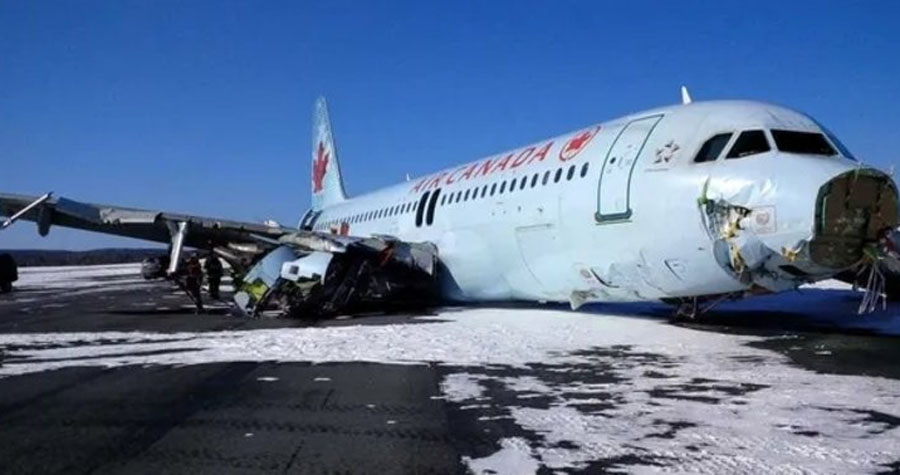
Air Canada flight partially catches fire after rough landing
A potentially disastrous situation unfolded at Halifax airport on Saturday evening when the wing of an Air Canada plane caught fire during its landing.
The plane, arriving from St. John’s, faced significant challenges as it touched down, resulting in a skid along the runway.
This led to a fire igniting on part of the aircraft, which temporarily halted operations at the airport.
PlatinumPost reports that the incident occurred hours before a major Jeju Airline plane’s crash that killed over 170 persons on Sunday morning in South Korea.
Nikki Valentine, a passenger on the Air Canada flight, described how one of the plane’s tires failed to deploy correctly upon landing.
READ ALSO:
- 2027: Why PDP shouldn’t field northern presidential candidate – Ex-Atiku campaigner
- Paris-bound businessman excretes 74 wraps of heroin, cocaine at Abuja airport
- Israeli forces order new evacuation at besieged northern Gaza
“The plane started to sit at about a 20-degree angle to the left and, as that happened, we heard a pretty loud — what almost sounded like a crash sound — as the wing of the plane started to skid along the pavement, along with what I presume was the engine,” she recalled.
“The plane shook quite a bit and we started seeing fire on the left side of the plane and smoke started coming in the windows,” she added.
The incident occurred at roughly 9:30 p.m. local time, involving Air Canada Flight 2259, which was operated by PAL Airlines, according to an official statement from the airport.
Though the statement did not specify how many passengers were aboard, it confirmed that all individuals were safely evacuated and transported to a hangar, where paramedics provided medical attention.
Valentine estimated the plane had around 80 passengers, with a layout of about 20 rows and two seats on each side of the aisle. She noted that the flight was nearly at full capacity, and it took roughly two minutes for all passengers to exit the aircraft safely.
She further shared that one side of the plane was engulfed in flames, “so everyone was pretty much in a hurry to get off — but an organized hurry.”
Valentine also mentioned that, while the passengers appeared to be unharmed, they were visibly shaken by the ordeal.
Air Canada flight partially catches fire after rough landing
International
Israeli forces order new evacuation at besieged northern Gaza

Israeli forces order new evacuation at besieged northern Gaza
CAIRO: Israeli forces carrying out a weeks-long offensive in northern Gaza ordered any residents remaining in Beit Hanoun to quit the town on Sunday, pointing to Palestinian militant rocket fire from the area, residents said.
The instruction to residents to leave caused a new wave of displacement, although it was not immediately clear how many people were affected, the residents said.
Israel says its almost three-month-old campaign in northern Gaza is aimed at Hamas militants and preventing them from regrouping. Its instructions to civilians to evacuate are meant to keep them out of harm’s way, the military says.
Palestinian and United Nations officials say no place is safe in Gaza and that evacuations worsen humanitarian conditions of the population.
Much of the area around the northern towns of Beit Hanoun, Jabalia and Beit Lahiya has been cleared of people and razed, fueling speculation that Israel intends to keep the area as a closed buffer zone after the fighting in Gaza ends.
The Israeli military announced its new push into the Beit Hanoun area on Saturday.
The Palestinian Civil Emergency Service said it had lost communication with people still trapped in the town, and it was unable to send teams into the area because of the raid.
READ ALSO:
- Police rescue 13 kidnap victims, arrest five suspected robbers
- El-Rufai accuses Tinubu govt of Yoruba agenda, Reno Omokri reacts
- Gbajabiamila speaks on his rumoured Lagos governorship ambition
On Friday, Israeli forces stormed the Kamal Adwan hospital in northern Gaza. The military said it was being used by militants, which Hamas denies.
The raid on the hospital, one of three medical facilities on the northern edge of Gaza, put the last major health facility in the area out of service, the World Health Organization (WHO) said in a post on X.
Some patients were evacuated from Kamal Adwan to the Indonesian Hospital, which is not in service, and medics were prevented from joining them there, the Health Ministry said. Other patients and staff were taken to other medical facilities.
On Sunday, health officials said an Israeli tank shell hit the upper floor of the Al-Ahly Arab Baptist Hospital in Gaza City near the X-ray division.
Meanwhile, Palestinian health officials said Israeli military strikes across the enclave killed at least 16 people on Sunday. One of those strikes killed seven people and wounded others at Al-WAFA Hospital in Gaza City, the Palestinian civil emergency service said in a statement.
The Israeli military said it was looking into the report.
Israel’s campaign against Hamas in Gaza has killed more than 45,300 Palestinians, according to health officials in the Hamas-run enclave. Most of the population of 2.3 million has been displaced and much of Gaza is in ruins.
The war was triggered by Hamas’ attack on southern Israel on Oct. 7, 2023, in which 1,200 people were killed and 251 taken to Gaza as hostages, according to Israeli tallies.
Israeli forces order new evacuation at besieged northern Gaza
International
Kemi Badenoch political career may be in danger – Top diplomat

Kemi Badenoch political career may be in danger – Top diplomat
Comments by the Leader of the Opposition in the United Kingdom (UK), Olukemi Olufunto Adegoke Badenoch, have sparked controversy in Nigeria with many outraged over the Leader of the Conservative Party statements which many interpreted as unpatriotic while some rose in her defence.
The British-Nigerian politician, who previously served in the UK Cabinet under Liz Truss and Rishi Sunak from 2022 to 2024, had made remarks that many Nigerians interpreted as offensive.
She replaced the party’s leader and immediate past UK Prime Minister, Rishi Sunak, after winning 57 per cent of party members’ votes to defeat former immigration minister Robert Jenrick.
The election, which saw her emerge as the first Black leader of a UK-wide political party, followed Mr Sunak’s resignation from the position after the party failed in the July general election, which produced Keir Starmer of the Labour Party as the new Prime Minister.
READ ALSO:
- Oluwo backs push for Sharia law in South-West
- Niger: DSS officers kill three notorious bandits, recover arms, motorbikes
- Shettima admits killing of civilians in Sokoto airstrikes, tenders apology
Her position places her as a potential Prime Minister of the UK.
Speaking with British media recently, Badenoch, who had earlier described her upbringing in Nigeria as being overshadowed by fear and insecurity in a country plagued by corruption, detached herself from Northern Nigeria, which she referred to as a haven for Islamism and Boko Haram.
“I find it interesting that everybody defines me as being Nigerian. I identify less with the country than with the specific ethnicity [Yoruba],” she said.
“I have nothing in common with the people from the north of the country, the Boko Haram where Islamism is.
“Being Yoruba is my true identity, and I refuse to be lumped with northern people of Nigeria, who ‘were our ethnic enemies, all in the name of being called a Nigerian.”
Kemi Badenoch political career may be in danger – Top diplomat
-

 Auto2 days ago
Auto2 days agoLSM MD extols founder’s qualities after latter posthumous industry award
-

 Entertainment2 days ago
Entertainment2 days agoMultiChoice announces free access to all DSTV channels for 3 days
-

 News2 days ago
News2 days agoNigeria Customs Service begins 2025 recruitment [How to apply]
-

 metro3 days ago
metro3 days agoJigawa State governor loses son 24 hours after mother’s death
-

 metro2 days ago
metro2 days agoHeavy security in Ilesa as ex-Osun deputy gov emerges new Owa-Obokun
-

 metro2 days ago
metro2 days agoLagos Imam to Tinubu: You haven’t disappointed us
-

 metro2 days ago
metro2 days agoDangote, Tinubu, Lookman named among 100 most influential Africans in 2024 (Full list)
-

 Sports2 days ago
Sports2 days agoRonaldo, Vinicius, Yamal win big at 2024 Globe Soccer Awards [Full list of winners]

